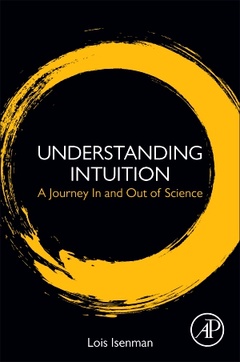Understanding Intuition A Journey In and Out of Science
Auteur : Isenman Lois

Understanding Intuition: A Journey In and Out of Science explores the biological and cognitive mechanisms that account for intuition, and examines the first-person experience. The book integrates both scientific and personal perspectives on this important yet elusive mental capacity. It uses specific encounters to illustrate that intuition is enhanced when we can attend to the subtle aspects of our inner experiences, such as bodily sensations, images, and differing kinds of intuitive evaluative feelings, all of which may emerge no further than on the fringe of awareness. This awareness of subtle inner experiences helps forge a more fluid exchange between the unconscious and conscious minds, and allows readers to calibrate their own intuitions. Over the course of the book, readers will gain a deeper appreciation and respect for the unconscious mind and its potential sophistication, and even its potential wisdom. Understanding Intuition is a timely and critical resource for students and researchers in psychology, cognitive science, theology, women?s studies, and neuroscience.
Students and researchers in psychology, cognitive science, theology, women’s studies, and neuroscience
- Stresses the powerful influence of the unconscious mind and its important adaptive role
- Frames intuition as significant and novel unconscious insight
- Presents a systematic framework for understanding different kinds of intuition
- Examines the emotional underpinnings of intuition, giving special emphasis to the role of somatic feelings and their derivatives
Date de parution : 01-2018
Ouvrage de 242 p.
15.2x22.8 cm
Thèmes d’Understanding Intuition :
Mots-clés :
A blink of the eye; Academic acceptance of intuition; Active imagination; Antonio Damasio; Artificial grammar learning; Associative processing; Barbara McClintock; Benjamin Libet; Brain laterality; Carl Jung; Chaos; Collective unconscious; Complex systems; Connectionism; David Bohm; Ego versus being; Einstein; Emergence; Emotional landscape; Feelings of knowing; Feelings of penetration; Feelings of relevance; Feelings of rightness; Feelings of truth; Frequency learning; George Lakoff; Gerald Holton; Global versus local focus; Gut feelings; Habitual thought versus intuition; Hadamard; Hunches; Implicit learning; Intuition and imagination; Intuition and science; Intuition versus sensation; Intuition; Intuitive cognition; Intuitive imagery; Intuitive processing; Intuitive self; Intuitive versus sensate perception; Intuitive versus sensate science; Iowa gambling experiment; Jonas Salk; Les Baux; Linus Pauling; Meaning making; Mental imagery; Metacognition; Metaphor and intuition; Mysticism; Neural networks; Noetic feelings; Ordinary thought versus intuition; Parallel interconnected information processing; Pattern formation; Pattern recognition; Presence; Receptivity; Science and spirituality; Scientific intuition versus artistic intuition; Self; Self-organization; Senior moment; Sequence learning; Somatic markers; Subjective versus objective; Tacit knowledge; Teilhard de Chardon; Unconscious cognition; Unconscious intelligence; Unconscious meaning making; Unconscious perception; Walter J; Freeman; Wholeness



